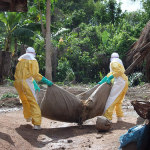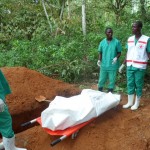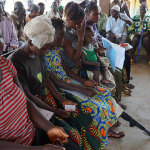This paper seeks to understand the fear many Guineans feel towards Ebola response initiatives and why the educators, doctors and burial teams have sometimes encountered resistance, occasionally violent. Resistance has been catastrophic for the epidemic, preventing treatment, contact tracing and quarantine, permitting its spread. The paper sketches a history of dissent and violence during the epidemic before showing how some actions that Ebola response teams interpret as ‘resistance’ are less actions ‘against’ Ebola response, than actions that have their own cultural logics. But the paper
Continue reading →
This briefing summarises the attitudes of Monrovia community leaders and residents towards cremation, mass burials, memorialization, and remembrance ceremonies based on data collected between August – September 2014.
Some attention has been paid to the alleged role of funerals in spreading Ebola Virus Disease in Upper West Africa. This has led to attempts to control funerals, causing both distress and active resistance. Critical examination of the role of the funeral event as a mechanism of Ebola transmission seems in order. In this paper, it is argued that funerals are inseparable from care for the sick, as far as Ebola transmission is concerned. The focal issue then becomes not control of funerals but reduction
Continue reading →
The aim of this briefing paper is to consider the various ways in which widely reported fear and resistance to the Ebola response can be understood, and what each way of understanding offers to those battling with the current epidemic. As far as this paper is concerned, there is no single ‘right way’ to comprehend resistance to educators, medics and burial teams, as this is a very complex social phenomenon. The aim instead is to outline the variety of ways in which resistance can be
Continue reading →
The current outbreak of Ebola Virus Disease in Upper West Africa is the largest ever recorded. Molecular evidence suggests spread has been almost exclusively through human-to-human contact. Social factors are thus clearly important to understand the epidemic and ways in which it might be stopped, but these factors have so far been little analyzed. The present paper focuses on Sierra Leone, and provides data on the least understood part of the epidemic – the largely undocumented spread of Ebola in rural areas. Various forms of
Continue reading →




